Soulcraft Aims For A Greater Audience By Transitioning to Cans
CAN YOU? What single element can turn previously laid-back fun-loving brewers into nose-to-the-grindstone workers? Oh, that could only be…success. CEO and Head Brewer Mike LaCroix of Soulcraft Brewery in Salida, CO and his team are transitioning from very limited bottling to full-out canning.
On his first day off in three weeks, he takes some time to breathe and reflect on this next transition: The “big spark” he believes will revolutionize this small brewery into a nationally recognized brand.
“We’ve been anticipating getting our beers into cans so we could reach a greater audience for quite a while,” says LaCroix. Soulcraft’s initial offerings in cans, the Sticky Pilsner, All Mountain Amber and the X-Ray IPA, were ready for a greater audience from Day One. These quality brews are wildly popular at the local taproom in this scenic Central Colorado town.
Feeling challenged, grateful and excited, they are now adjusting to this new packaging. This is the story of how a small brewery goes from draught to growlers to bombers to cans. And keeps its sanity.
Or mostly.
Why Cans?
The craft beer industry is notoriously sensitive to consumer’s tastes and whims. As craft consumers evolved from drinking at the local brewery to wanting it at home to taking it along on adventures, brewers have been quick to adjust.
“I think the popularity of cans started with the outdoor recreation crowd. Colorado is such an active, outdoorsy state so that on-the-go option is very attractive here,” La Croix says.
Beer stays fresher in cans because light and oxygen can’t penetrate. There’s also the think-green mentality that appreciates the can’s greater global responsibility. Cans have a smaller carbon footprint and use less energy to recycle. They’re also much lighter than bottles and mega stackable so more product can be shipped in one truck, causing much less CO2 emissions.
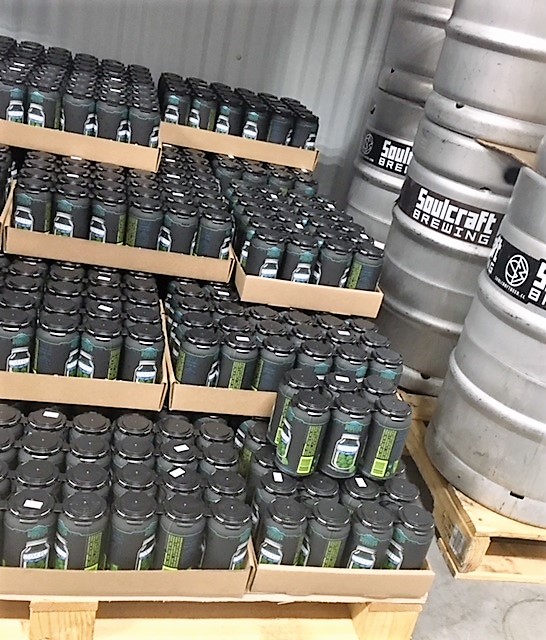
Can Plans
Soulcraft didn’t immediately leap into the canning game, though. Soooo many breweries were getting into it all at once, flooding the market. They were already invested in bombers. They hoped that would pan out. It didn’t.
“We wanted to see how bombers would do first because they have the biggest profit margin of any package. But sales were slower than anticipated and we knew we needed to make the change,” says LaCroix.
But there were loads of details and dollars and designs to figure out first. Researching the best machine took some time. At first they thought they’d buy a used one, so they visited breweries with systems for sale in Golden and Denver. But then they discovered a new line of smaller canning machines that made buying a new one possible.
They purchased a state-of-the-art smaller scale canning line from Michigan-based MicroCanner. Capable of producing 60 cases of 12-ounce cans an hour, the automated machine can also be tweaked to increase that output.
“The others we looked at required auxillary equipment but this canner was ready to go right out of the box,” says LaCroix. “We love that it is so feature-rich and it is relatively inexpensive compared to others.”
MicroCanner’s marketers promise their “solid, robust system is far easier to operate than any on the market.” LaCroix agrees it is user-friendly but adds that it can be a little more labor intensive. The machine requires human hands to place cans onto the front line and then take full ones off at the end. This hasn’t required Soulcraft to hire more hands – yet—but only because they are able to utilize staff in different ways. They do plan to add a Packaging Manager as the lead technician and a second technician, however.
Two MicroCanner technicians flew out from Michigan to personally show the Soulcraft crew how it is done. They were running it by themselves by the second day. The machine has a very small foot-print so Soulcraft didn’t have to add on to their building to accommodate the machinery. Right now the canning machine hums three days a week, two shifts a day and is easily set up before and broken down after each use.
Testing for beer quality before canning is very similar to what’s involved in bottling. The small differences are just part of the learning curve for the new venture.
They’ve already decided to add a six-pack carrier applicator that applies the new-style Paktech handle. With this add-on, instead of grabbing individual cans at the end and hand-applying the carrier, the six-packs will roll out already attached.
Soulcraft got a five year low-interest loan on their machine equipment. They expect revenues on canning orders will more than cover the monthly loan payments but it may take three months before they break even on some of the other expenditures.
Additional revenue comes from their successful taproom, of course. With 16 beers on tap, Soulcraft’s large tasting room and outdoor beer garden attract both loyal locals as well as the many tourists passing through.
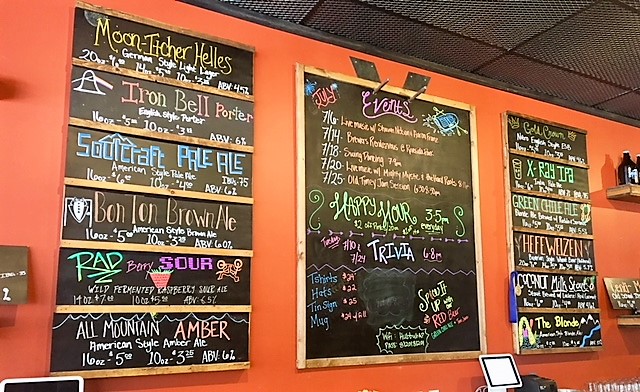
Art of the Can
The look of the can is “very, very important,” LaCroix says. Their bottles have always been little works of art, so they didn’t want to compromise that when they transitioned to cans. They took their time to ensure the can designs were as eye-catching and amazing as the beers contained within.
“There is whimsy built in to every design,” says La Croix. “It represents us. It shows the personality of our brewery. We don’t want a corporate look or feel to anything we do. We want our mountain-vibe and small-town feel to come through.”
Instead of printing directly on the can, they’re using digitally-produced illustrations on shrink-sleeves, They use a black matte finish with a lot of detail so even ghost images are revealed in different lights and angles and when wet. The extra expense is worth it to them.
The art is created by Salida graphic artist Kurt Snyder of Drawn Wild with a little help from the brewery management team.
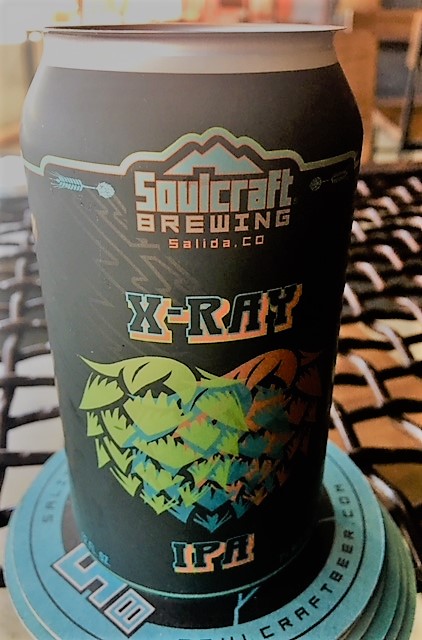
Get Out There
Soulcraft cans broke into the ultra-important Denver market during the last week of July but their relationship with Western Distributing began two years before Soulcraft even broke ground. The head brewer from Eddyline Brewing in nearby Buena Vista referred LaCroix and helped arrange an introductory meeting.
“Once Soulcraft got going, they were eager to work with us,” LaCroix says. Western Distributing is a family-owned specialty niche beer and wine distributor based in Denver. Their business was established just after Prohibition.
When Soulcraft was ready to distribute bombers locally, Western made it happen.
“The locals loved us from the start. We get premium eye-level shelf space at Chaffee County liquor stores. We’re very spoiled locally,” he says. Outside of their fan-base, it is a little more challenging.
LaCroix explains this particular distributor has a different approach. Western is big on building the whole brand so they won’t put Soulcraft into stores that allow space for only one of their beers. They want to have several kinds available so it makes a bigger presence. As a result it is harder to get everywhere you want to be, but overall the strategy is a great one.
“The distributor has been fabulous to work with. They’ve been very patient and very clear in their expectations. But the distributor’s orders are steep. I think they wanted to push us, to see what we can do,” says LaCroix. They’re pushing themselves, too. They’re anticipating increasing orders and adding another year-round product then rotating seasonals.
“It is a pretty big change for us. It doubles or even triples our capacity so now we’re working hard to keep up. But we’re doing it.”
And don’t worry – they’re still laid-back fun-loving brewers.
One can find Soulcraft at select locations in Colorado.


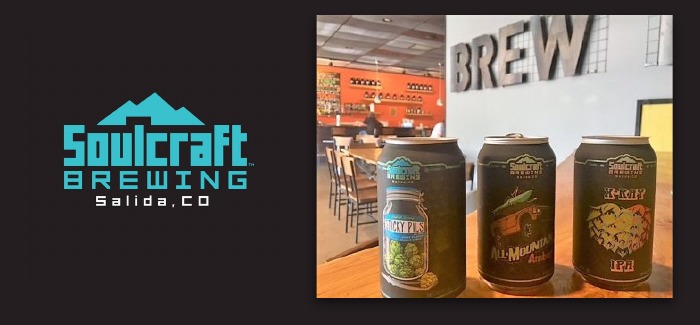

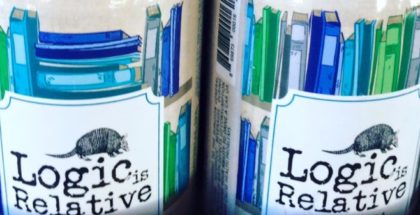

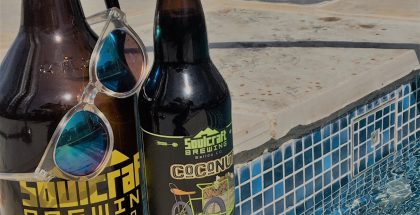


Submit a Comment